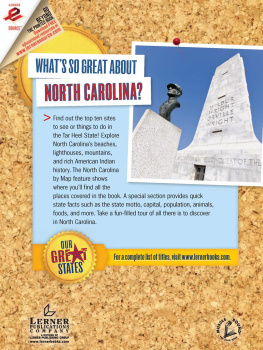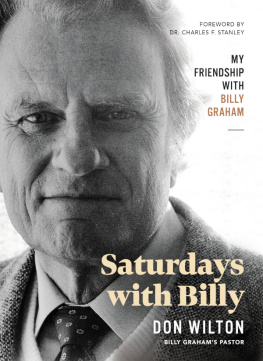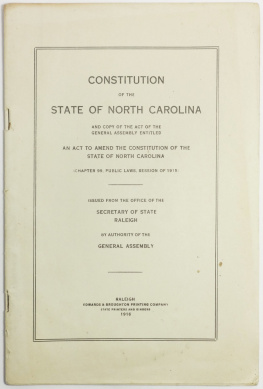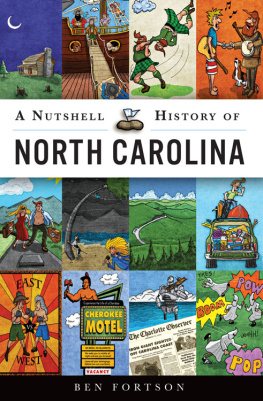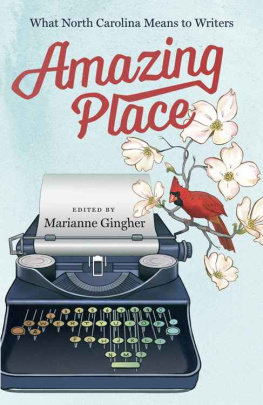Published by The History Press
Charleston, SC 29403
www.historypress.net
Copyright 2008 by Billy Yeargin
All rights reserved
Front Cover: There was a time when folks had better things to do than just sitting around in a comfortable reclining chair clicking remote buttons. In that once upon a time era, tobacco farmers took great pleasure and pride in showing off their tobacco-producing talents. The proof is illustrated on our front cover. This picture, taken in the summer of 1942, exemplifies all the pride that comes with curing a good barn of tobacco. As sister Betsy holds the horse, named Nellie, and a handsome little four-year-old future farmer looks on, Tom Hobgood, a Granville County tobacco farmer, presents one of the finer sticks of newly cured tobacco.
All photographs courtesy of the author unless otherwise noted.
First published 2008
Second printing 2011
Third printing 2012
Fourth printing 2013
e-book edition 2013
Manufactured in the United States
ISBN 978.1.62584.373.9
Library of Congress Cataloging-in-Publication Data
Yeargin, Billy.
Remembering North Carolina tobacco / Billy Yeargin.
p. cm.
print edition ISBN 978-1-59629-433-2
1. Tobacco--North Carolina--Anecdotes. 2. Tobacco farms--North Carolina--Anecdotes. 3. Farm life--North Carolina--Anecdotes. 4. Yeargin, Billy. I. Title.
SB273.Y44 2008
633.7109756--dc22
[B]
2007051918
Notice: The information in this book is true and complete to the best of our knowledge. It is offered without guarantee on the part of the author or The History Press. The author and The History Press disclaim all liability in connection with the use of this book.
All rights reserved. No part of this book may be reproduced or transmitted in any form whatsoever without prior written permission from the publisher except in the case of brief quotations embodied in critical articles and reviews.
Introduction
Since Jamestowns most famous entrepreneur, John Rolfe, first gambled on the market value of tobacco in 1612, Americans have enjoyed a love-hate relationship with this wicked weed.
Long before Rolfes marketing venture with British merchants, King James launched his distaste for what he termed the foul weed. His opinion was cited in the 1604 issue of his famous A Counterblaste to Tobacco, wherein he referred to tobacco as Harmful to the Lungs and Hateful to the Nose. He then proceeded to levy a steep tax on the weed that underwrote his lewd, lascivious and boisterous lifestyle, which lasted far beyond his ability to enjoy it.
From Rolfes first commercial venture, and lasting until the French and Indian War of 1763, America was the very definition of a tobacco society. Our tax obligations to the Crown were paid in pounds of tobacco. Wives were purchased and preachers were paid with pounds of tobacco. Tobacco was the currency that paid all the bills.
Seven of our first nine presidents were tobacco farmers, Washington and Jefferson being the most revered. Patrick Henry, the great Liberty or Death orator, rose to fame from litigation involving a preacher and his tobacco salary.
All of those facts are important. More important, though, is tobaccos ground-level influence on those of us who grew up on the mid-Atlantic tobacco farms of the greatest country on earth. We proudly proclaim our tobacco heritage.
Every story is different; yet every story is the same.
As a child, awakening every morning to both the smell and view of tobacco in some stage of preparation, growth, harvest or curing, I was surrounded by all the appurtenances of a tobacco dominion. I got sick and tired of it in a hurry.
Probably no one on the face of the earth ever hated tobacco farming as much as I did. Probably no one on the face of the earth loved it as much as my daddy. At the time, I just couldnt understand why he loved it so much. I thought maybe he had met with some mind-altering disease in his early life that left him with a severely warped sense of values and choices of how to make a decent living.
From the time of the first planting in early May until the last tips were pulled in September or October, Daddy simply could not stay out of the tobacco field. During working hours he walked up and down and across the rows, directing the business of plowing, hoeing, topping, suckering and priming, all with a scowl on his face. Really, his face was not that of a happy man. Mama used to say that he would twist his face around when he got mad. So I guess he stayed mad a lot in the tobacco field.
Yet, on Sunday afternoon, or any time when company came, he strutted like a proud papa as he hosted the visitors out to the fields. Notice how even these stalks are, he would say. We spent a lot of time getting all the weeds out, but it looks a whole lot better than some other folks tobacco Ive seen. Reckon well have to git started on these ground primings next Monday. This stuffll run away with you in a hurry ifn you dont keep up with them leaves yallowing.
I believe this here is gonna be the best crop Ive had since just after the war, I once heard him say to Mr. Kennon Taylor, president of the Oxford National Bank. In retrospect, I realize that he was setting the stage for borrowing money for that years labor expenses.
Whatever personal differences or likenesses have arisen among tobacco farmers, one thing has been forevermore etched in stone: fraternal bonding and pride. Pride in tobacco; pride in the warmth that comes in nurturing tobacco from the planting to the warehouse; pride in the character built by the process, in the process and from the process. Process was not just a conscious issuethere was the subconscious issue of husbandry and identity. Much more so, though, tobacco farming was an issue of ancestral roots, of cultural continuity.
Both sides of my family were products of the American tobacco culture. My maternal family came from the Murray, Noblin and Mangum tobacco kingdoms of nineteenth-century Southside Virginia and the Piedmont hills of upper Durham County and lower Person County, both of which are sandwiched in between Durham and Danville, Virginia. On the paternal side came the proud Adcocks (of Dutchville Wrapper fame) and Averettes of lower Granville County, as well as the Wake and Orange County Yeargins. Among the preachers, educators and storekeepers there were a couple of horse thieves, but all were the children of tobacco and all were proud of who they were.
The recollections and stories born of life on a tobacco farm bring great pride to me. It is where I came from. And it commands a tough hide and a tender heart. I thank God for choosing the unique environment He did for me, all woven together around some element of an American tobacco culture. That culture shadows me at every turn in the road.
As you close the pages of this book, it is my sincere hope that somewhere inside you will have read a passage or seen a picture of yourself, if not in fact, at least in memory. If so, please feel free to add your own caption.




